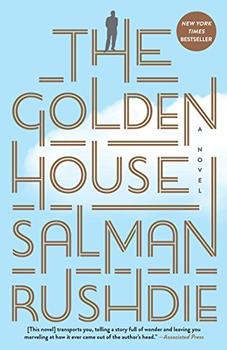Summary | Excerpt | Reading Guide | Reviews | Beyond the Book | Readalikes | Genres & Themes | Author Bio

A Novel
by Salman Rushdie
In the evening of November 26 something happened in the big house, an argument of some sort between Caesar and his wife, and she sent for the Mercedes and the driver and left the house in distress, on her way to seek the consolation of her friends, and that was how she came to be sitting in the Sea Lounge of the hotel that everyone loved, eating cucumber sandwiches and drinking heavily sweetened fresh lime juice, when the hallucinating gunmen burst in giggling with joy, with spiraling eyeballs and psychedelic imaginary birds fluttering around their heads, and began shooting to kill.
And yes, the country was India, of course, the city was Bombay, of course, the house was a part of the luxurious Walkeshwar colony on Malabar Hill, and yes, of course, these were the Muslim terrorist attacks launched from Pakistan by Lashkar-e-Taiba, the "Army of the Righteous," first on the railway station formerly known as Victoria Terminus or VT and presently, like everything else in Bombay/Mumbai, renamed after the Mahratta hero-prince Shivaji—and then on Leopold Café in Colaba, the Oberoi Trident Hotel, the Metro Cinema, the Cama and Albless Hospital, the Jewish Chabad House, and the Taj Mahal Palace and Tower Hotel. And yes, after the three-day sieges and battles were done, the mother of the two older Golden boys (of the youngest son's mother we will have more to say hereafter) was numbered among the dead.
When the old man heard that his wife was trapped inside the Taj his knees gave way and he would have fallen down the marble steps of his marble house, from his marble living room to the marble terrace below, if there had not been a servant close enough to catch him, but then there was always a servant. He remained on his knees and buried his face in his hands and his body was racked by sobs so loud and convulsive that it seemed as if a creature hidden deep within himself was trying to escape. For the entire duration of the attacks he stayed in the position of prayer at the top of the marble steps, refusing to eat or sleep, pounding his chest with a fist like a professional mourner at a funeral, and blaming himself. I didn't know she was going there, he cried, I should have known, why did I let her go. In those days the air in the city felt dark as blood even at high noon, dark as a mirror, and the old man saw himself reflected in it and didn't like what he saw; and such was the force of his vision that his boys saw it too, and after the bad news came, the news that ended their whole life up to that point, the weekend walks around the racecourse with representatives of the great old families of Bombay and the new money people too, squash and bridge and swimming and badminton and golf at the Willingdon Club, movie starlets, hot jazz, all of it gone forever because drowned beneath a sea of death, they went along with what their father said he wanted now, which was to leave this marble place forever, and the broken quarreling city in which it stood, and the whole dirty corrupt vulnerable country as well, their everything which their father now suddenly or perhaps not so suddenly detested, they agreed to obliterate every detail of what it had been to them and who they had been in it and what they had lost: the woman whose husband had shouted at her and so drove her to her doom, whose two sons had loved her, and who had once been so badly humiliated by her stepson that she tried to kill herself. They would wipe the slate clean, take on new identities, cross the world and be other than what they were. They would escape from the historical into the personal, and in the New World the personal would be all they sought and all they expected, to be detached and individual and alone, each of them to make his own agreement with the everyday, outside history, outside time, in private. It did not occur to any of them that their decision was born of a colossal sense of entitlement, this notion that they could just step away from yesterday and start tomorrow as if it wasn't a part of the same week, to move beyond memory and roots and language and race into the land of the self-made self, which is another way of saying, America.
Excerpted from The Golden House by Salman Rushdie. Copyright © 2017 by Salman Rushdie. Excerpted by permission of Random House. All rights reserved. No part of this excerpt may be reproduced or reprinted without permission in writing from the publisher.




There is no worse robber than a bad book.
Click Here to find out who said this, as well as discovering other famous literary quotes!
Your guide toexceptional books
BookBrowse seeks out and recommends the best in contemporary fiction and nonfiction—books that not only engage and entertain but also deepen our understanding of ourselves and the world around us.